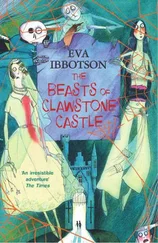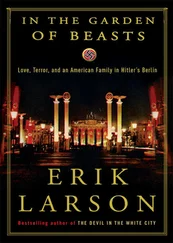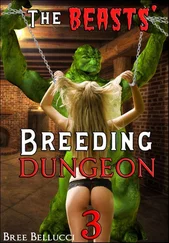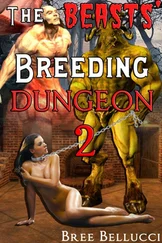“Your show begins again tonight, doesn’t it,” Bree said as Meric laid out their plain supper. “Does it mention them?”
“No. We didn’t have tape or film. It wouldn’t have done much good.”
“People don’t know what to think, though.” She tucked the robe between her brown thighs and knelt Japanese-fashion before the table. “Should they be here?”
“They’re not men.”
“You know what I mean.” The Preserve — the land that Candy’s Mountain owned — was strictly forbidden to hunters, hikers, trespassers — men.
“I don’t know, There was talk sometime of putting them on a reservation. They have to live.”
“You feel sorry for them?” Bree asked.
“Yes. They’re not men. They don’t have freedom of choice, I don’t think.
They can’t decide, like we can, not to… not to be…”
“Carnivores.”
“Yes, Not to be what they are.”
“We thank Thee, O Lord,” Bree said, her long-lashed eyes lowered, “for these gifts Thou hast given us, which we are about to receive, in Jesus’s name, amen.”
She took bread, broke it, and gave it to him.
When Meric had first come to live here, twenty years before, he was six years old and the great structure had not been inhabited for much longer than that. Its growth had begun to slow; it would never reach its two hundredth level. It would never, then, match exactly the exquisite model of it that Isidore Candy had made long before it had been begun. Among Meric’s most deeply imprinted memories was his first sight of that model. In fact he remembered so little of his life before the Mountain — the fleeing, displaced life of refugees that burns an everlasting faint mark of insecurity on the soul but leaves few stationary objects in the mind — that it seemed as though his life began in front of that model.
“Look!” his mother said when their tiny, exhausted caravan was still miles away. “It’s Candy’s Mountain!” The enormous mass of it, blue with distance, rose like many great shoulders lifting themselves out of the earth; the skeleton shoulders of all the dead Titans coming forth together. Once it hove over the horizon, he saw it always no matter how the road they traveled twisted away from it; yet it was so big that it was a long time before they seemed to come any closer to it. It grew, and he must look always more sharply upward to see it, until they stood on the wide stairs of its threshold. The sea of grass they had crossed broke against those stairs in a foam of weed and flower, drowning the first tread, for no road on terrace led up to it. He stood on the stairs as though on a cliffy shore. When he tried to look up, though, the cliffs above were too huge to see. Around him, his people were mounting the stairs toward a hundred entrances that stood wide and waiting across the broken front; someone took his hand and he went up, but it was the Mountain itself that drew him in.
Their steps echoed in the vastest indoors Meric had ever seen on even dreamed of. The echoes had echoes, and those echoes fainter echoes. The whole arriving caravan was scattered across the chalky, naked stone of the floor, sitting on their bags or moving about, seeking friends, but they made no impression on the space, didn’t diminish it at all. Yet at the same time its height and breadth were full of noises, people, activity, comings and goings, because the central atrium was strung all around with galleries, terraces, and catwalks; its depths were peopled, densely. Now that he was inside, it didn’t seem to be a cliff on the seashore but the interior of the sea itself: life and movement, schools of busyness at every level.
He almost didn’t dare to take steps there. There were so many directions to go, none marked and all seemingly infinite, that no decision was possible. Then a focus was given him: a girl, almost his age, in a dress of Blue, whose dark skin was like silk in the watery depths of this sunshot sea. She moved among the strangers as one who lived there, one of those who had taken the strangers in, one of those whom the weary, sad, desperate people he had traveled with wanted to become; and at that moment Meric wanted even more than that: he wanted to be her.
He hadn’t ever quite stopped wanting that.
“Come see,” she said to him, or at least to him and to others standing around him, grownups too distracted to hear her. He went with her, though, straight across the floor and into depths, following her. Beyond the central atrium, walls divided the space, bisecting it, halving and quartering it again and again as though he proceeded down some narrowing throat; and yet the heights and breadths remained, because most of these bisecting walls were transparent, an openwork of slats and suspended walks and cable-flown platforms, wood, metal, glass.
The place she brought him to, he knew now. years later, was in the very center of the Mountain. On a table there, standing nearly as high as himself, was the model of the Mountain. It was less like the model of a place than the idea of Place: space endlessly geometered by symmetries of lines, levels, limits. The sense grew only slowly in him that this was a model of the place he had come to live, that these dense accretions of closely set lines and serrated spaces modeled places large enough to live out lives in: were huge. The atrium he had stood stupefied in would not, in this model, have contained his fist; he could not have put a finger between the floors of any of the levels where multitudes lived and worked. Its tininess was the hugest thing he had ever seen. This, he thought, is how big it is. Its lines of wall and floor were made of materials whose fineness only made the idea of it grow bigger in his mind: gold wire and pins and grommets small as needles’ eyes, steps made from single thicknesses of paper. Those steps he had mounted.
The girl pointed to a photograph suspended behind the model. An old man in a battered hat and a creased white shirt, with many pens in his shirt pocket; eyes kindlier than Santa Claus’s and a beard like his too, which came almost to his waist.
“He built it,” she said, and he knew that she meant both the model and in some sense single-handedly the place it was in as well. “His name was Isidore Candy. My name is Bree.”
Around them as they ate, Bree and Meric heard the endless, wordless voice of their level and, though too faint to be distinguished, of others too. The panels of paper that were all that made this space theirs, panels that in every size, height, and extent were all that made any space a space on this level, vibrated like fine drumheads to the voices, the gatherings of people, and the noises of work and machinery, a noise so constant and so multiform in its variations that they really didn’t hear it at all; nor were they heard.
“How many are there?” Bree asked.
“Nobody’s sure.” He took more of the dense, crumbling bread. “Maybe ten or so.”
“What is it they call it?” Bree said. “I mean a family of lions. Do they use the same word?”
“Pride,” Meric said. He looked at Bree. There was in her brown, goldflecked eyes an unease he couldn’t read but knew; knew well, though never how to make it pass. Was it fear? She didn’t look at him. “A pride of lions. They use the same word.”
She stood, and he suggested to himself that he not follow her with his eyes around the house (“house” they called it, as they called workspaces “offices” and meeting-spaces “halls”; they knew what they meant). Something had been growing in her all day, he could tell it by her continual small questions, whose answers she didn’t quite listen to.
Somewhere, clay bells rang, calling to meeting or prayer.
“Sodality tonight?” he asked. Why wasn’t his tenderness a stronger engine against her moods?
Читать дальше












